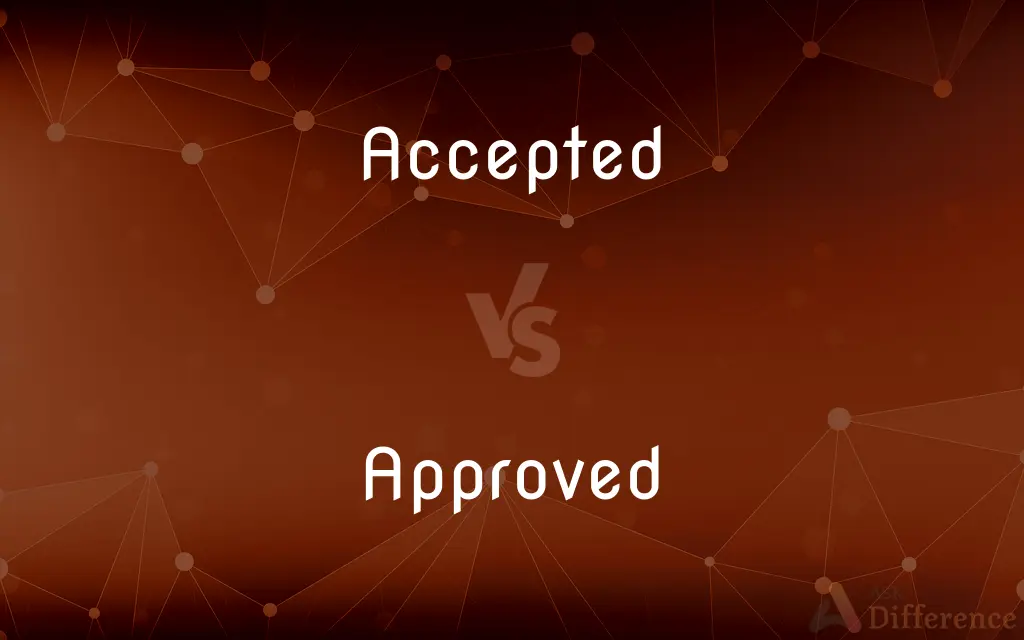Accepted vs. Approved — What's the Difference?
By Maham Liaqat & Urooj Arif — Updated on April 4, 2024
Accepted refers to the acknowledgment or reception of something as satisfactory, while approved implies formal endorsement or sanction.

Difference Between Accepted and Approved
Table of Contents
ADVERTISEMENT
Key Differences
Accepted and approved, though often used interchangeably, carry distinct nuances in meaning and application. Accepted generally indicates that something has been received favorably or regarded as satisfactory, without necessarily implying a formal process. It could refer to social acceptance, the acknowledgment of an idea, or the willingness to tolerate a situation. Approval, on the other hand, denotes a formal endorsement, often by an authority or through a standardized process. This implies not only acceptance but also a level of sanction or authorization that meets specific criteria or standards.
In practical terms, being accepted can relate to personal, social, or professional contexts where specific criteria are not strictly applied. For instance, an individual might be accepted into a social group based on shared interests or mutual acquaintances, without a formal evaluation. Approval, however, typically involves a more formal review and endorsement process. For example, a project proposal may be accepted by a team as a good idea, but it requires management's approval to proceed, which involves meeting predefined standards or obtaining necessary resources.
The distinction also extends to documentation and regulatory contexts. A document or application can be accepted when it is received and deemed complete by an institution or organization. However, its approval may depend on a thorough evaluation against certain standards or regulations, often involving a decision-making process by authorized personnel or bodies.
In educational settings, a student's application to a university might be accepted based on meeting the basic submission requirements, such as filing by the deadline and completing all sections of the application form. However, the approval for admission is a separate process that evaluates the applicant's qualifications against the institution's criteria for acceptance into a program.
The emotional and psychological implications of acceptance and approval differ. Acceptance often carries a sense of belonging or acknowledgment at a personal or community level, impacting an individual's social identity and self-esteem. Approval, especially in professional or formal contexts, can validate an individual's competence, ideas, or status, reinforcing professional identity and authority.
ADVERTISEMENT
Comparison Chart
Definition
Acknowledgment or reception as satisfactory.
Formal endorsement or sanction.
Context
Can be informal, personal, or professional.
Typically formal, often requiring authority or standards.
Process
Implies receptiveness, not necessarily a formal process.
Involves evaluation against specific criteria or standards.
Application
Social acceptance, ideas, tolerance of situations.
Projects, regulations, standards compliance.
Emotional Impact
Relates to belonging, personal acknowledgment.
Validates competence, ideas, authority.
Compare with Definitions
Accepted
Implies a degree of receptiveness or agreement.
The artwork was accepted into the exhibition based on its thematic fit.
Approved
Carries a sense of authority, formal endorsement.
The drug was approved by the health authorities for public use.
Accepted
Broad, ranging from personal to informal professional settings.
The suggestion was accepted by the committee but needed higher approval.
Approved
Tied to specific criteria, standards, or regulations.
The course curriculum was approved by the accreditation committee.
Accepted
Acknowledged or received favorably, often without formal criteria.
Her apology was accepted by her friends.
Approved
Officially sanctioned or endorsed following specific criteria.
The project was approved after meeting all regulatory requirements.
Accepted
Often personal, affecting social or individual status.
He was accepted into the community group.
Approved
Formal, requiring authority or adherence to standards.
The new policy was approved by the board of directors.
Accepted
Can apply to ideas, people, situations, without formal endorsement.
The concept was widely accepted, though not officially endorsed.
Approved
Professional, legal, or regulatory, with broader impact.
The building plans were approved by the city council.
Accepted
Accepted is a 2006 American comedy film directed by Steve Pink and written by Adam Cooper, Bill Collage and Mark Perez. The plot follows a group of high school graduates who create their own fake college after being rejected from the colleges to which they applied.
Approved
To consent to officially or formally; confirm or sanction
The Senate approved the treaty.
Accepted
Widely used, recognized, or approved
An accepted treatment for pneumonia.
Approved
To consider right or good
"He came to ask me ... whether I approved his choice altogether" (Jane Austen).
Accepted
Simple past tense and past participle of accept
Approved
(Obsolete)To prove or attest.
Accepted
Generally approved, believed, or recognized.
Approved
To show, feel, or express approval
We didn't approve of the decision.
Accepted
Generally approved or compelling recognition;
Several accepted techniques for treating the condition
His recognized superiority in this kind of work
Approved
Having received approval.
Employees' approved expense claims will be reimbursed by the 4th of the following month.
Accepted
Generally agreed upon; not subject to dispute;
The accepted interpretation of the poem
An accepted theory
Approved
(archaic) Proven or demonstrated by experience.
Accepted
Generally accepted or used;
Accepted methods of harmony and melody
Three accepted types of pump
Approved
Simple past tense and past participle of approve
Accepted
Judged to be in conformity with approved usage;
Acceptable English usage
Approved
Established by authority; given authoritative approval;
A list of approved candidates
Accepted
Widely or permanently accepted;
An accepted precedent
Approved
Generally or especially officially judged acceptable or satisfactory;
An approved method
Work on the approved project went ahead on schedule
Accepted
Widely accepted as true or worthy;
The accepted wisdom about old age
A received moral idea
Received political wisdom says not; surveys show otherwise
Common Curiosities
Can something be accepted but not approved?
Yes, something can be informally accepted or considered satisfactory without formal approval.
What does it mean when something is accepted?
It means it has been received favorably or considered satisfactory, often informally.
Can approval be revoked?
Yes, if the conditions for approval change or if ongoing compliance is not maintained.
What is the process for approval?
Approval involves a formal evaluation and endorsement by an authority, based on specific criteria.
What are examples of approval in a professional context?
Examples include project funding approval, regulatory compliance certification, and policy endorsement.
How does acceptance impact an individual socially?
Social acceptance can enhance an individual's sense of belonging and self-esteem.
What role does authority play in approval?
Authority ensures that the approval process is carried out according to predefined standards and criteria.
Why is formal approval necessary in certain situations?
Formal approval is necessary to ensure compliance with legal, regulatory, or organizational standards.
How do acceptance and approval affect a project?
Acceptance can motivate and encourage involvement, while approval formally allows a project to proceed or receive resources.
How does acceptance differ in personal contexts?
In personal contexts, acceptance often relates to social inclusion or acknowledgment without formal criteria.
Can a product be marketed without approval?
Depending on the product and jurisdiction, formal approval may be required for legal marketing.
How do cultural differences impact acceptance and approval?
Cultural norms and values can influence the criteria for social acceptance and the process of formal approval.
What is the significance of peer approval in academic settings?
Peer approval, such as in peer-reviewed journals, validates the quality and credibility of academic work.
How do acceptance and approval interact in workplace dynamics?
Workplace dynamics may involve seeking both social acceptance from peers and formal approval from superiors for proposals or projects.
Is acceptance enough for legal or regulatory compliance?
No, legal or regulatory compliance typically requires formal approval.
Share Your Discovery

Previous Comparison
Whinge vs. Moan
Next Comparison
Cauldron vs. KettleAuthor Spotlight
Written by
Maham LiaqatCo-written by
Urooj ArifUrooj is a skilled content writer at Ask Difference, known for her exceptional ability to simplify complex topics into engaging and informative content. With a passion for research and a flair for clear, concise writing, she consistently delivers articles that resonate with our diverse audience.














































